Understanding Cultural Intelligence and Cultural Capability in Society
VerifiedAdded on 2023/03/31
|7
|1470
|329
Essay
AI Summary
This essay delves into the concepts of cultural awareness and cultural intelligence, emphasizing their significance in today's culturally diverse world, particularly within organizational settings. It defines cultural awareness as the understanding of one's own culture and the objective examination of its values, beliefs, and traditions, while cultural intelligence is described as the ability to effectively navigate and address differences between cultures, especially in multicultural workplaces. The essay critically analyzes how cultural awareness enables individuals to develop cultural intelligence by providing a foundation for understanding and respecting cultural norms, which in turn facilitates effective communication and adaptation in diverse environments. A personal assessment reflects on the value of cultural awareness in fostering open-mindedness and enhancing cultural knowledge, ultimately contributing to improved performance and influence in organizational settings. The conclusion underscores the essential role of cultural awareness in cultivating cultural intelligence and highlights the practical benefits observed in professional environments.
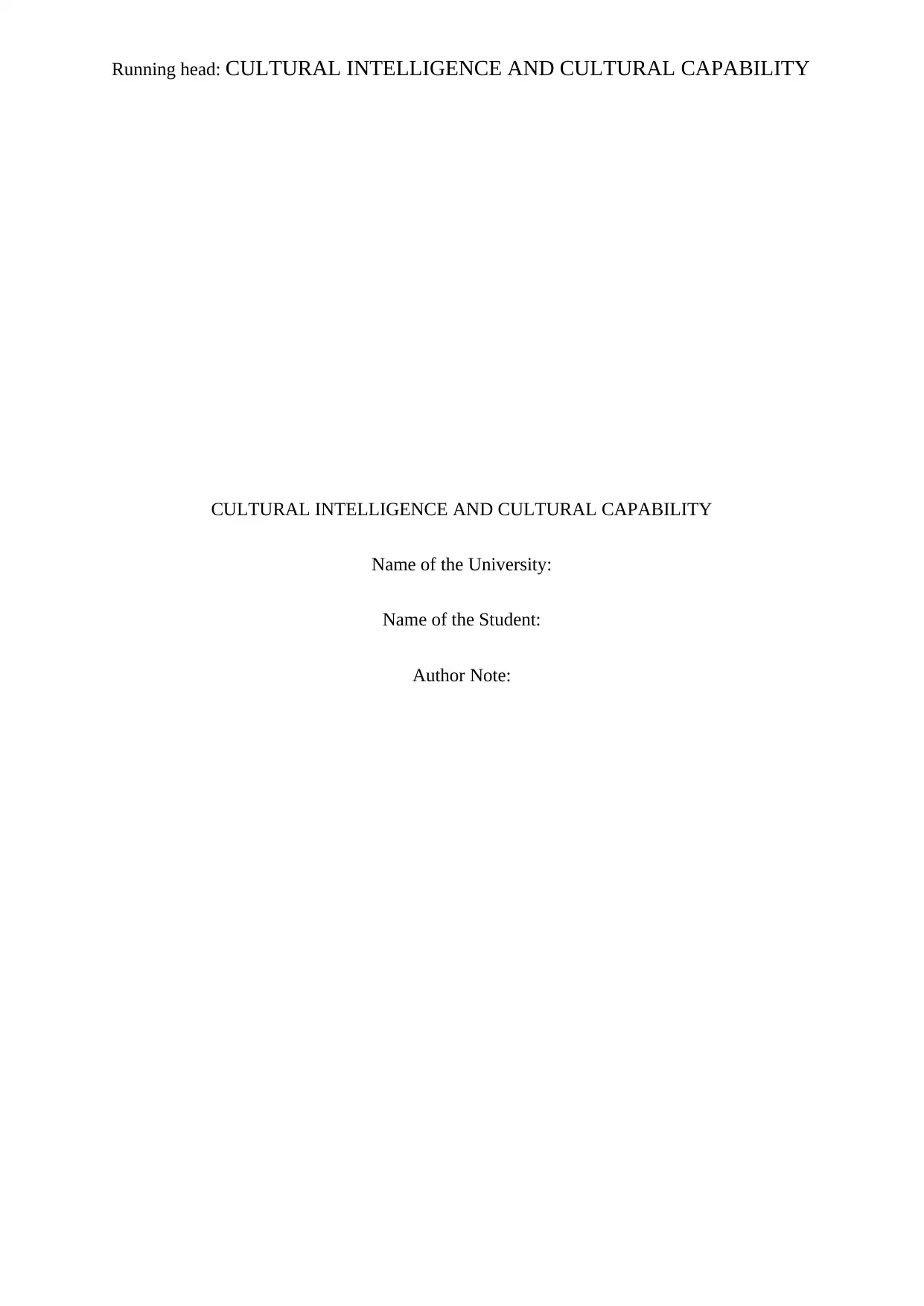
Running head: CULTURAL INTELLIGENCE AND CULTURAL CAPABILITY
CULTURAL INTELLIGENCE AND CULTURAL CAPABILITY
Name of the University:
Name of the Student:
Author Note:
CULTURAL INTELLIGENCE AND CULTURAL CAPABILITY
Name of the University:
Name of the Student:
Author Note:
Paraphrase This Document
Need a fresh take? Get an instant paraphrase of this document with our AI Paraphraser
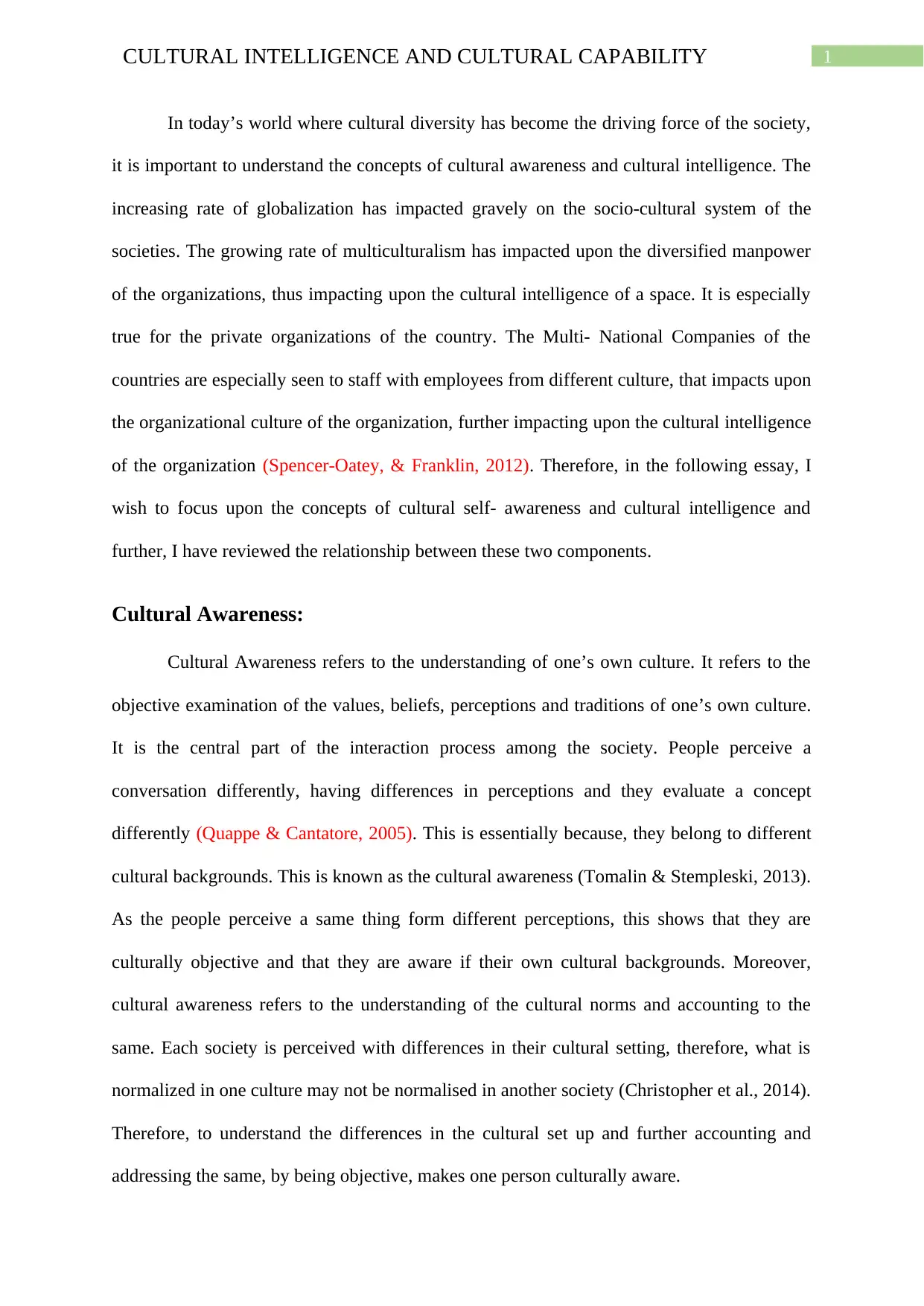
1CULTURAL INTELLIGENCE AND CULTURAL CAPABILITY
In today’s world where cultural diversity has become the driving force of the society,
it is important to understand the concepts of cultural awareness and cultural intelligence. The
increasing rate of globalization has impacted gravely on the socio-cultural system of the
societies. The growing rate of multiculturalism has impacted upon the diversified manpower
of the organizations, thus impacting upon the cultural intelligence of a space. It is especially
true for the private organizations of the country. The Multi- National Companies of the
countries are especially seen to staff with employees from different culture, that impacts upon
the organizational culture of the organization, further impacting upon the cultural intelligence
of the organization (Spencer-Oatey, & Franklin, 2012). Therefore, in the following essay, I
wish to focus upon the concepts of cultural self- awareness and cultural intelligence and
further, I have reviewed the relationship between these two components.
Cultural Awareness:
Cultural Awareness refers to the understanding of one’s own culture. It refers to the
objective examination of the values, beliefs, perceptions and traditions of one’s own culture.
It is the central part of the interaction process among the society. People perceive a
conversation differently, having differences in perceptions and they evaluate a concept
differently (Quappe & Cantatore, 2005). This is essentially because, they belong to different
cultural backgrounds. This is known as the cultural awareness (Tomalin & Stempleski, 2013).
As the people perceive a same thing form different perceptions, this shows that they are
culturally objective and that they are aware if their own cultural backgrounds. Moreover,
cultural awareness refers to the understanding of the cultural norms and accounting to the
same. Each society is perceived with differences in their cultural setting, therefore, what is
normalized in one culture may not be normalised in another society (Christopher et al., 2014).
Therefore, to understand the differences in the cultural set up and further accounting and
addressing the same, by being objective, makes one person culturally aware.
In today’s world where cultural diversity has become the driving force of the society,
it is important to understand the concepts of cultural awareness and cultural intelligence. The
increasing rate of globalization has impacted gravely on the socio-cultural system of the
societies. The growing rate of multiculturalism has impacted upon the diversified manpower
of the organizations, thus impacting upon the cultural intelligence of a space. It is especially
true for the private organizations of the country. The Multi- National Companies of the
countries are especially seen to staff with employees from different culture, that impacts upon
the organizational culture of the organization, further impacting upon the cultural intelligence
of the organization (Spencer-Oatey, & Franklin, 2012). Therefore, in the following essay, I
wish to focus upon the concepts of cultural self- awareness and cultural intelligence and
further, I have reviewed the relationship between these two components.
Cultural Awareness:
Cultural Awareness refers to the understanding of one’s own culture. It refers to the
objective examination of the values, beliefs, perceptions and traditions of one’s own culture.
It is the central part of the interaction process among the society. People perceive a
conversation differently, having differences in perceptions and they evaluate a concept
differently (Quappe & Cantatore, 2005). This is essentially because, they belong to different
cultural backgrounds. This is known as the cultural awareness (Tomalin & Stempleski, 2013).
As the people perceive a same thing form different perceptions, this shows that they are
culturally objective and that they are aware if their own cultural backgrounds. Moreover,
cultural awareness refers to the understanding of the cultural norms and accounting to the
same. Each society is perceived with differences in their cultural setting, therefore, what is
normalized in one culture may not be normalised in another society (Christopher et al., 2014).
Therefore, to understand the differences in the cultural set up and further accounting and
addressing the same, by being objective, makes one person culturally aware.
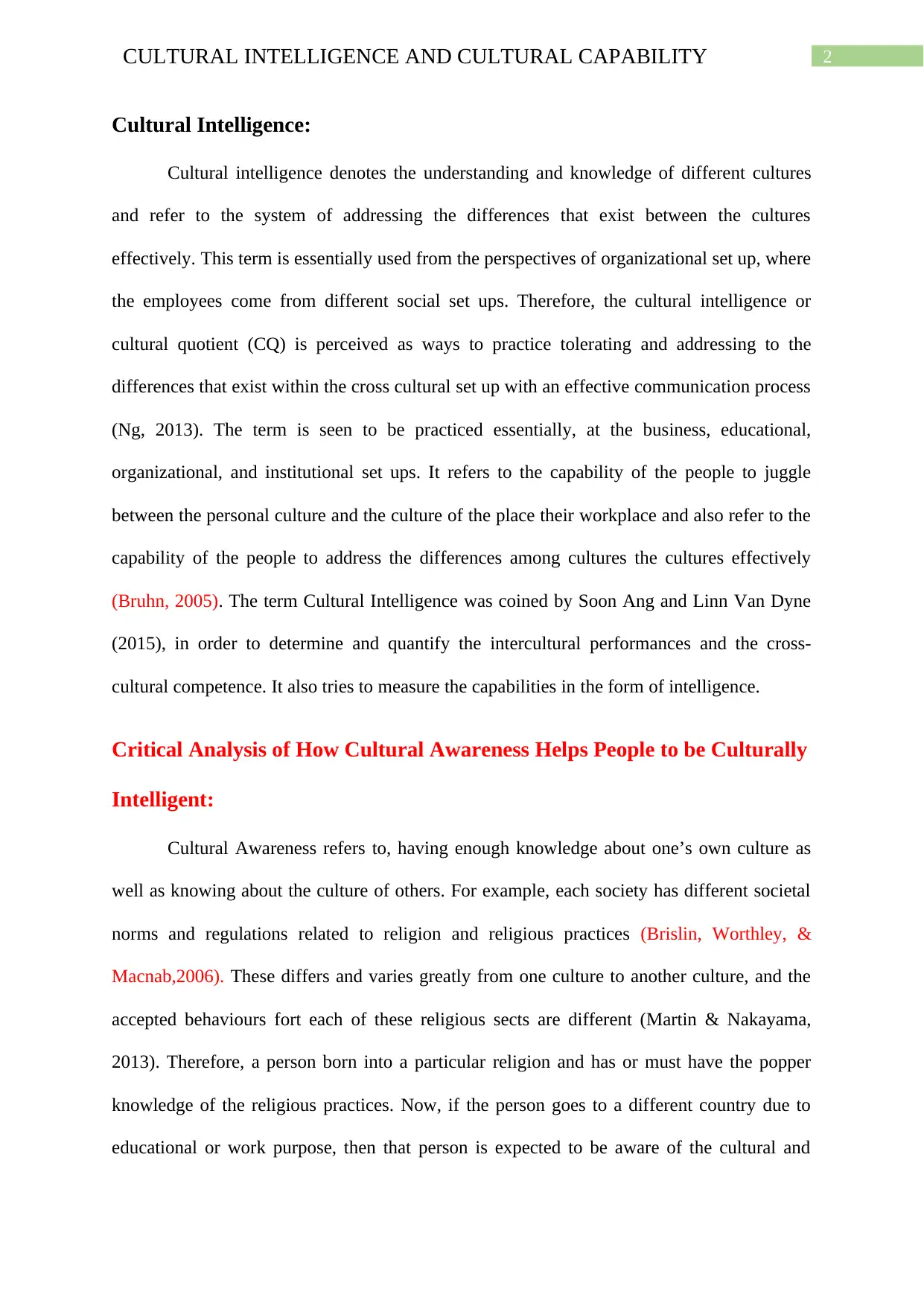
2CULTURAL INTELLIGENCE AND CULTURAL CAPABILITY
Cultural Intelligence:
Cultural intelligence denotes the understanding and knowledge of different cultures
and refer to the system of addressing the differences that exist between the cultures
effectively. This term is essentially used from the perspectives of organizational set up, where
the employees come from different social set ups. Therefore, the cultural intelligence or
cultural quotient (CQ) is perceived as ways to practice tolerating and addressing to the
differences that exist within the cross cultural set up with an effective communication process
(Ng, 2013). The term is seen to be practiced essentially, at the business, educational,
organizational, and institutional set ups. It refers to the capability of the people to juggle
between the personal culture and the culture of the place their workplace and also refer to the
capability of the people to address the differences among cultures the cultures effectively
(Bruhn, 2005). The term Cultural Intelligence was coined by Soon Ang and Linn Van Dyne
(2015), in order to determine and quantify the intercultural performances and the cross-
cultural competence. It also tries to measure the capabilities in the form of intelligence.
Critical Analysis of How Cultural Awareness Helps People to be Culturally
Intelligent:
Cultural Awareness refers to, having enough knowledge about one’s own culture as
well as knowing about the culture of others. For example, each society has different societal
norms and regulations related to religion and religious practices (Brislin, Worthley, &
Macnab,2006). These differs and varies greatly from one culture to another culture, and the
accepted behaviours fort each of these religious sects are different (Martin & Nakayama,
2013). Therefore, a person born into a particular religion and has or must have the popper
knowledge of the religious practices. Now, if the person goes to a different country due to
educational or work purpose, then that person is expected to be aware of the cultural and
Cultural Intelligence:
Cultural intelligence denotes the understanding and knowledge of different cultures
and refer to the system of addressing the differences that exist between the cultures
effectively. This term is essentially used from the perspectives of organizational set up, where
the employees come from different social set ups. Therefore, the cultural intelligence or
cultural quotient (CQ) is perceived as ways to practice tolerating and addressing to the
differences that exist within the cross cultural set up with an effective communication process
(Ng, 2013). The term is seen to be practiced essentially, at the business, educational,
organizational, and institutional set ups. It refers to the capability of the people to juggle
between the personal culture and the culture of the place their workplace and also refer to the
capability of the people to address the differences among cultures the cultures effectively
(Bruhn, 2005). The term Cultural Intelligence was coined by Soon Ang and Linn Van Dyne
(2015), in order to determine and quantify the intercultural performances and the cross-
cultural competence. It also tries to measure the capabilities in the form of intelligence.
Critical Analysis of How Cultural Awareness Helps People to be Culturally
Intelligent:
Cultural Awareness refers to, having enough knowledge about one’s own culture as
well as knowing about the culture of others. For example, each society has different societal
norms and regulations related to religion and religious practices (Brislin, Worthley, &
Macnab,2006). These differs and varies greatly from one culture to another culture, and the
accepted behaviours fort each of these religious sects are different (Martin & Nakayama,
2013). Therefore, a person born into a particular religion and has or must have the popper
knowledge of the religious practices. Now, if the person goes to a different country due to
educational or work purpose, then that person is expected to be aware of the cultural and
⊘ This is a preview!⊘
Do you want full access?
Subscribe today to unlock all pages.

Trusted by 1+ million students worldwide
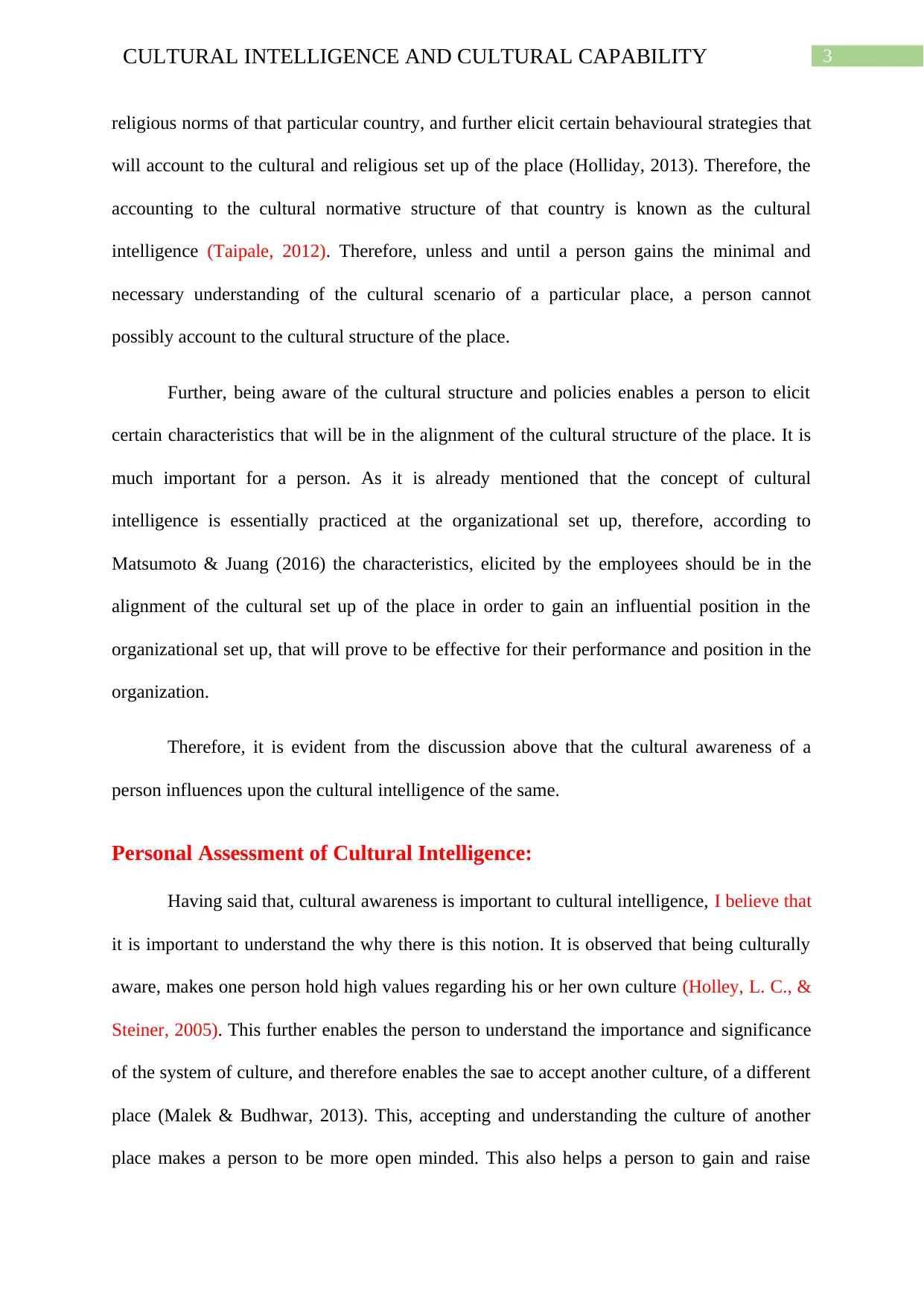
3CULTURAL INTELLIGENCE AND CULTURAL CAPABILITY
religious norms of that particular country, and further elicit certain behavioural strategies that
will account to the cultural and religious set up of the place (Holliday, 2013). Therefore, the
accounting to the cultural normative structure of that country is known as the cultural
intelligence (Taipale, 2012). Therefore, unless and until a person gains the minimal and
necessary understanding of the cultural scenario of a particular place, a person cannot
possibly account to the cultural structure of the place.
Further, being aware of the cultural structure and policies enables a person to elicit
certain characteristics that will be in the alignment of the cultural structure of the place. It is
much important for a person. As it is already mentioned that the concept of cultural
intelligence is essentially practiced at the organizational set up, therefore, according to
Matsumoto & Juang (2016) the characteristics, elicited by the employees should be in the
alignment of the cultural set up of the place in order to gain an influential position in the
organizational set up, that will prove to be effective for their performance and position in the
organization.
Therefore, it is evident from the discussion above that the cultural awareness of a
person influences upon the cultural intelligence of the same.
Personal Assessment of Cultural Intelligence:
Having said that, cultural awareness is important to cultural intelligence, I believe that
it is important to understand the why there is this notion. It is observed that being culturally
aware, makes one person hold high values regarding his or her own culture (Holley, L. C., &
Steiner, 2005). This further enables the person to understand the importance and significance
of the system of culture, and therefore enables the sae to accept another culture, of a different
place (Malek & Budhwar, 2013). This, accepting and understanding the culture of another
place makes a person to be more open minded. This also helps a person to gain and raise
religious norms of that particular country, and further elicit certain behavioural strategies that
will account to the cultural and religious set up of the place (Holliday, 2013). Therefore, the
accounting to the cultural normative structure of that country is known as the cultural
intelligence (Taipale, 2012). Therefore, unless and until a person gains the minimal and
necessary understanding of the cultural scenario of a particular place, a person cannot
possibly account to the cultural structure of the place.
Further, being aware of the cultural structure and policies enables a person to elicit
certain characteristics that will be in the alignment of the cultural structure of the place. It is
much important for a person. As it is already mentioned that the concept of cultural
intelligence is essentially practiced at the organizational set up, therefore, according to
Matsumoto & Juang (2016) the characteristics, elicited by the employees should be in the
alignment of the cultural set up of the place in order to gain an influential position in the
organizational set up, that will prove to be effective for their performance and position in the
organization.
Therefore, it is evident from the discussion above that the cultural awareness of a
person influences upon the cultural intelligence of the same.
Personal Assessment of Cultural Intelligence:
Having said that, cultural awareness is important to cultural intelligence, I believe that
it is important to understand the why there is this notion. It is observed that being culturally
aware, makes one person hold high values regarding his or her own culture (Holley, L. C., &
Steiner, 2005). This further enables the person to understand the importance and significance
of the system of culture, and therefore enables the sae to accept another culture, of a different
place (Malek & Budhwar, 2013). This, accepting and understanding the culture of another
place makes a person to be more open minded. This also helps a person to gain and raise
Paraphrase This Document
Need a fresh take? Get an instant paraphrase of this document with our AI Paraphraser
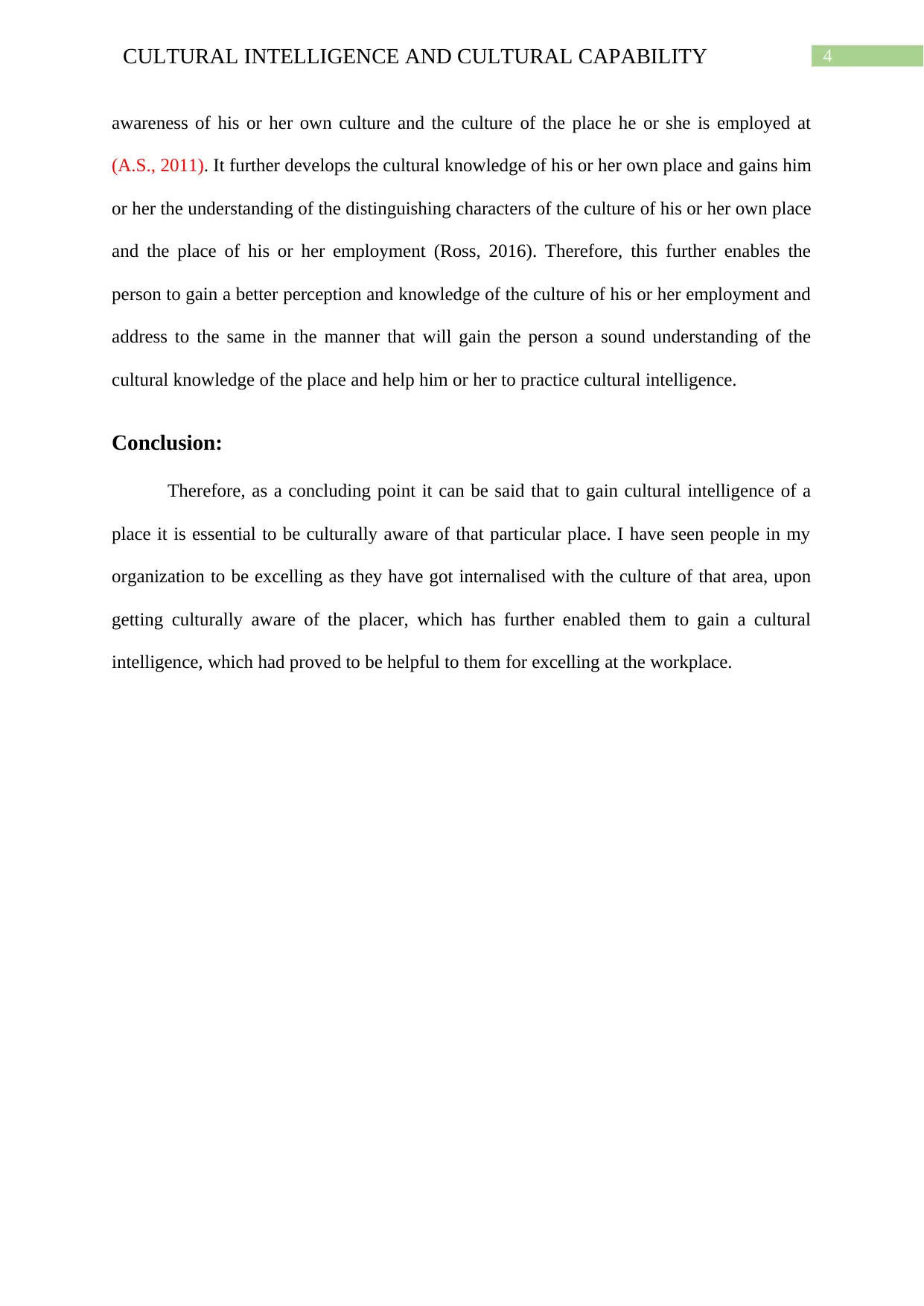
4CULTURAL INTELLIGENCE AND CULTURAL CAPABILITY
awareness of his or her own culture and the culture of the place he or she is employed at
(A.S., 2011). It further develops the cultural knowledge of his or her own place and gains him
or her the understanding of the distinguishing characters of the culture of his or her own place
and the place of his or her employment (Ross, 2016). Therefore, this further enables the
person to gain a better perception and knowledge of the culture of his or her employment and
address to the same in the manner that will gain the person a sound understanding of the
cultural knowledge of the place and help him or her to practice cultural intelligence.
Conclusion:
Therefore, as a concluding point it can be said that to gain cultural intelligence of a
place it is essential to be culturally aware of that particular place. I have seen people in my
organization to be excelling as they have got internalised with the culture of that area, upon
getting culturally aware of the placer, which has further enabled them to gain a cultural
intelligence, which had proved to be helpful to them for excelling at the workplace.
awareness of his or her own culture and the culture of the place he or she is employed at
(A.S., 2011). It further develops the cultural knowledge of his or her own place and gains him
or her the understanding of the distinguishing characters of the culture of his or her own place
and the place of his or her employment (Ross, 2016). Therefore, this further enables the
person to gain a better perception and knowledge of the culture of his or her employment and
address to the same in the manner that will gain the person a sound understanding of the
cultural knowledge of the place and help him or her to practice cultural intelligence.
Conclusion:
Therefore, as a concluding point it can be said that to gain cultural intelligence of a
place it is essential to be culturally aware of that particular place. I have seen people in my
organization to be excelling as they have got internalised with the culture of that area, upon
getting culturally aware of the placer, which has further enabled them to gain a cultural
intelligence, which had proved to be helpful to them for excelling at the workplace.
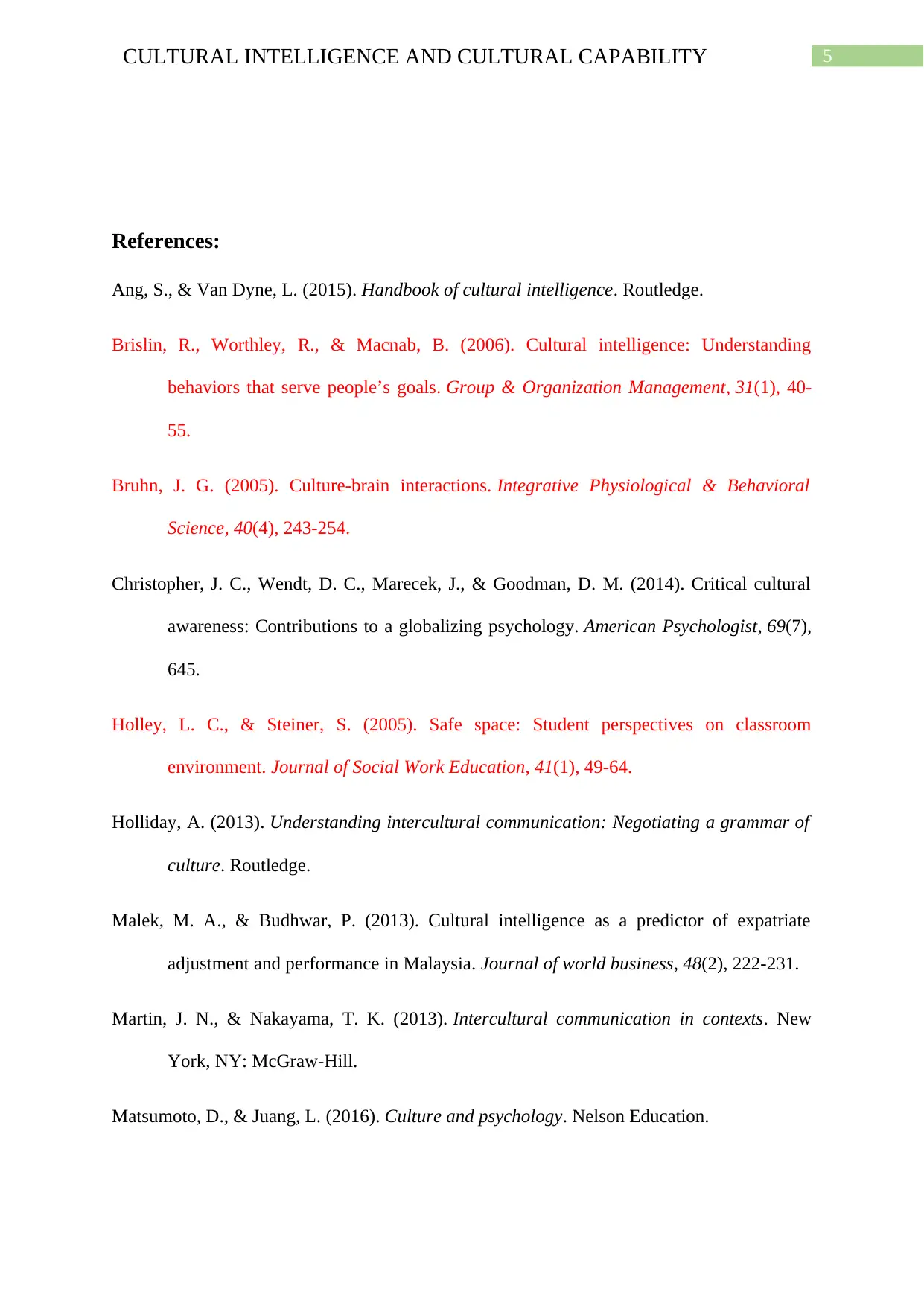
5CULTURAL INTELLIGENCE AND CULTURAL CAPABILITY
References:
Ang, S., & Van Dyne, L. (2015). Handbook of cultural intelligence. Routledge.
Brislin, R., Worthley, R., & Macnab, B. (2006). Cultural intelligence: Understanding
behaviors that serve people’s goals. Group & Organization Management, 31(1), 40-
55.
Bruhn, J. G. (2005). Culture-brain interactions. Integrative Physiological & Behavioral
Science, 40(4), 243-254.
Christopher, J. C., Wendt, D. C., Marecek, J., & Goodman, D. M. (2014). Critical cultural
awareness: Contributions to a globalizing psychology. American Psychologist, 69(7),
645.
Holley, L. C., & Steiner, S. (2005). Safe space: Student perspectives on classroom
environment. Journal of Social Work Education, 41(1), 49-64.
Holliday, A. (2013). Understanding intercultural communication: Negotiating a grammar of
culture. Routledge.
Malek, M. A., & Budhwar, P. (2013). Cultural intelligence as a predictor of expatriate
adjustment and performance in Malaysia. Journal of world business, 48(2), 222-231.
Martin, J. N., & Nakayama, T. K. (2013). Intercultural communication in contexts. New
York, NY: McGraw-Hill.
Matsumoto, D., & Juang, L. (2016). Culture and psychology. Nelson Education.
References:
Ang, S., & Van Dyne, L. (2015). Handbook of cultural intelligence. Routledge.
Brislin, R., Worthley, R., & Macnab, B. (2006). Cultural intelligence: Understanding
behaviors that serve people’s goals. Group & Organization Management, 31(1), 40-
55.
Bruhn, J. G. (2005). Culture-brain interactions. Integrative Physiological & Behavioral
Science, 40(4), 243-254.
Christopher, J. C., Wendt, D. C., Marecek, J., & Goodman, D. M. (2014). Critical cultural
awareness: Contributions to a globalizing psychology. American Psychologist, 69(7),
645.
Holley, L. C., & Steiner, S. (2005). Safe space: Student perspectives on classroom
environment. Journal of Social Work Education, 41(1), 49-64.
Holliday, A. (2013). Understanding intercultural communication: Negotiating a grammar of
culture. Routledge.
Malek, M. A., & Budhwar, P. (2013). Cultural intelligence as a predictor of expatriate
adjustment and performance in Malaysia. Journal of world business, 48(2), 222-231.
Martin, J. N., & Nakayama, T. K. (2013). Intercultural communication in contexts. New
York, NY: McGraw-Hill.
Matsumoto, D., & Juang, L. (2016). Culture and psychology. Nelson Education.
⊘ This is a preview!⊘
Do you want full access?
Subscribe today to unlock all pages.

Trusted by 1+ million students worldwide
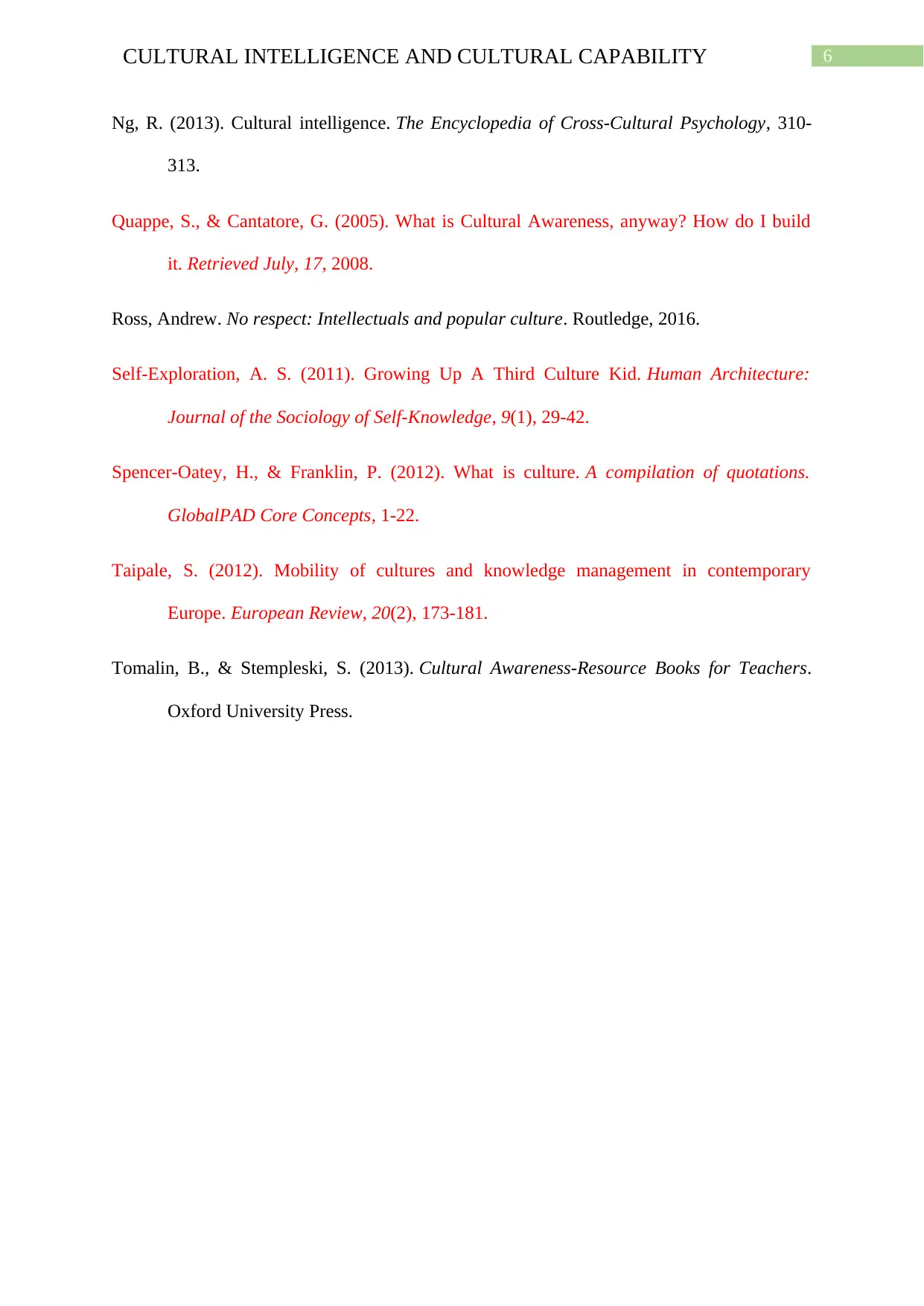
6CULTURAL INTELLIGENCE AND CULTURAL CAPABILITY
Ng, R. (2013). Cultural intelligence. The Encyclopedia of Cross‐Cultural Psychology, 310-
313.
Quappe, S., & Cantatore, G. (2005). What is Cultural Awareness, anyway? How do I build
it. Retrieved July, 17, 2008.
Ross, Andrew. No respect: Intellectuals and popular culture. Routledge, 2016.
Self-Exploration, A. S. (2011). Growing Up A Third Culture Kid. Human Architecture:
Journal of the Sociology of Self-Knowledge, 9(1), 29-42.
Spencer-Oatey, H., & Franklin, P. (2012). What is culture. A compilation of quotations.
GlobalPAD Core Concepts, 1-22.
Taipale, S. (2012). Mobility of cultures and knowledge management in contemporary
Europe. European Review, 20(2), 173-181.
Tomalin, B., & Stempleski, S. (2013). Cultural Awareness-Resource Books for Teachers.
Oxford University Press.
Ng, R. (2013). Cultural intelligence. The Encyclopedia of Cross‐Cultural Psychology, 310-
313.
Quappe, S., & Cantatore, G. (2005). What is Cultural Awareness, anyway? How do I build
it. Retrieved July, 17, 2008.
Ross, Andrew. No respect: Intellectuals and popular culture. Routledge, 2016.
Self-Exploration, A. S. (2011). Growing Up A Third Culture Kid. Human Architecture:
Journal of the Sociology of Self-Knowledge, 9(1), 29-42.
Spencer-Oatey, H., & Franklin, P. (2012). What is culture. A compilation of quotations.
GlobalPAD Core Concepts, 1-22.
Taipale, S. (2012). Mobility of cultures and knowledge management in contemporary
Europe. European Review, 20(2), 173-181.
Tomalin, B., & Stempleski, S. (2013). Cultural Awareness-Resource Books for Teachers.
Oxford University Press.
1 out of 7
Related Documents
Your All-in-One AI-Powered Toolkit for Academic Success.
+13062052269
info@desklib.com
Available 24*7 on WhatsApp / Email
![[object Object]](/_next/static/media/star-bottom.7253800d.svg)
Unlock your academic potential
Copyright © 2020–2026 A2Z Services. All Rights Reserved. Developed and managed by ZUCOL.





